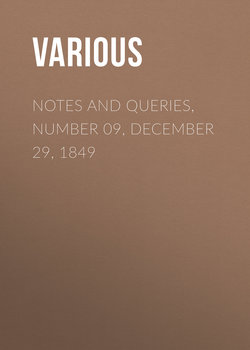Читать книгу Notes and Queries, Number 09, December 29, 1849 - Various - Страница 5
OUR PROGRESS
MATHEMATICAL ARCHÆOLOGY
ОглавлениеSir,—I cannot gather from your "Notes" that scientific archæology is included in your plan, nor yet, on the other hand, any indications of its exclusion. Science, however, and especially mathematical science, has its archæology; and many doubtful points of great importance are amongst the "vexed questions" that can only be cleared up by documentary evidence. That evidence is more likely to be found mixed up amongst the masses of papers belonging to systematic collectors than amongst the papers of mere mathematicians—amongst men who never destroy a paper because they have no present use for it, or because the subject does not come within the range of their researches, than amongst men who value nothing but a "new theorem" or "an improved solution."
As a general rule I have always habituated myself to preserve every scrap of paper of any remote (and indeed recent) period, that had the appearance of being written by a literary man, whether I knew the hand, or understood the circumstance to which it referred, or not. Such papers, whether we understand them or not, have a possible value to others; and indeed, as my collections have always been at the service of my friends, very few indeed have been left in my hands, and those, probably, of no material value.
I wish this system were generally adopted. Papers, occasionally of great historical importance, and very often of archæological interest, would thus be preserved, and, what is more, used, as they would thus generally find their way into the right hands.
There are, I fancy, few classes of papers that would be so little likely to interest archæologists in general, as those relating to mathematics; and yet such are not unlikely to fall in their way, often and largely, if they would take the trouble to secure them. I will give an example or two, indicating the kind of papers which are desiderata to the mathematical historian.
1. A letter from Dr. Robert Simson, the editor of Euclid and the restorer of the Porisms, to John Nourse of the Strand, is missing from an otherwise unbroken series, extending from 1 Jan. 1751 to near the close of Simson's life. The missing letter, as is gathered from a subsequent one, is Feb. 5. 1753. A mere letter of business from an author to his publisher might not be thought of much interest; but it need not be here enforced how much of consistency and clearness is often conferred upon a series of circumstances by matter which such a letter might contain. This letter, too, contains a problem, the nature of which it would be interesting to know. It would seem that the letter passed into the hands of Dodson, editor of the Mathematical Repository; but what became of Dodson's papers I could never discover. The uses, however, to which such an unpromising series of letters have been rendered subservient may be seen in the Philosophical Magazine, under the title of "Geometry and Geometers," Nos. ii. iii. and iv. The letters themselves are in the hands of Mr. Maynard, Earl's Court, Leicester Square.
2. Thomas Simpson (a name venerated by every geometer) was one of the scientific men consulted by the committee appointed to decide upon the plans for Blackfriars Bridge, in 1759 and 1760.
"It is probable," says Dr. Hutton, in his Life of Simpson, prefixed to the Select Exercises, 1792, "that this reference to him gave occasion to his turning his thoughts more seriously to this subject, so as to form the design of composing a regular treatise upon it: for his family have often informed me that he laboured hard upon this work for some time before his death, and was very anxious to have completed it, frequently remarking to them that this work, when published, would procure him more credit than any of his former publications. But he lived not to put the finishing hand to it. Whatever he wrote upon this subject probably fell, together with all his other remaining papers, into the hands of Major Henry Watson, of the Engineers, in the service of the India Company, being in all a large chest full of papers. This gentleman had been a pupil of Mr. Simpson's, and had lodged in his house. After Mr. Simpson's death Mr. Watson prevailed upon the widow to let him have the papers, promising either to give her a sum of money for them, or else to print and publish them for her benefit. But nothing of the kind was ever done; this gentleman always declaring, when urged on this point by myself and others, that no use could be made of any of the papers, owing to the very imperfect state in which he said they were left. And yet he persisted in his refusal to give them up again.
